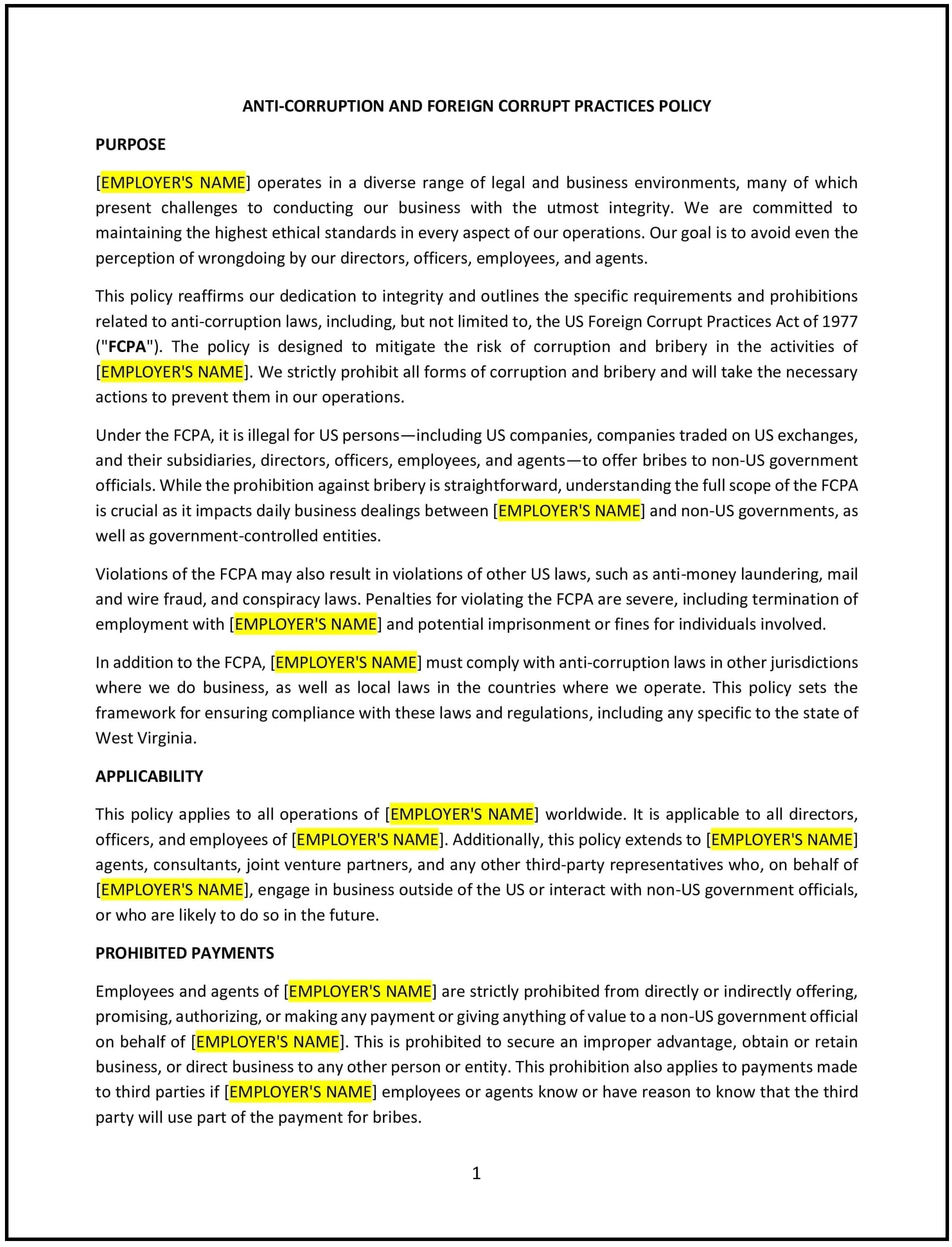Anti-corruption and foreign corrupt practices policy (West Virginia): Free template
Got contracts to review? While you're here for policies, let Cobrief make contract review effortless—start your free review now.

Customize this template for free
Anti-corruption and foreign corrupt practices policy
An anti-corruption and foreign corrupt practices policy helps West Virginia businesses maintain ethical standards and comply with anti-corruption laws, including the Foreign Corrupt Practices Act (FCPA) and other relevant regulations. This policy outlines the company’s stance on corruption, bribery, and unethical conduct, providing clear guidelines for employees on how to avoid engaging in illegal or unethical activities, both domestically and abroad.
By implementing this policy, businesses can mitigate the risk of corruption, safeguard their reputation, and enhance compliance with anti-bribery laws.
How to use this anti-corruption and foreign corrupt practices policy (West Virginia)
- Define corruption and bribery: Clearly define what constitutes corruption, bribery, and other unethical practices, such as offering, giving, or receiving bribes or kickbacks.
- Set guidelines for prohibited conduct: Outline the types of conduct that are prohibited, including giving or accepting bribes, facilitating payments, or offering anything of value to foreign officials to influence decisions.
- Establish reporting procedures: Create a confidential reporting system for employees to report suspected violations of the policy without fear of retaliation.
- Promote due diligence: Require employees and business partners to conduct thorough due diligence when engaging with third parties, ensuring that the business maintains high ethical standards in all transactions.
- Offer training and education: Provide regular training for employees on anti-corruption laws and company policies to help them recognize and avoid potential violations.
- Include enforcement measures: Specify the consequences for violating the policy, including disciplinary action, termination, or legal prosecution in serious cases.
Benefits of using this anti-corruption and foreign corrupt practices policy (West Virginia)
This policy offers several benefits for West Virginia businesses:
- Reduces legal and financial risks: By improving compliance with anti-corruption laws, the business reduces the risk of costly fines, legal penalties, and reputational damage.
- Protects the company’s reputation: A clear stance on anti-corruption helps build a strong reputation for integrity, both locally and internationally, attracting partners and customers who value ethical business practices.
- Fosters a culture of integrity: This policy establishes a strong foundation of ethical behavior within the organization, encouraging employees to uphold high standards of honesty and transparency.
- Enhances compliance with global regulations: The policy helps the company adhere to both West Virginia state laws and international anti-bribery laws, such as the FCPA and the UK Bribery Act.
- Prevents fraud and unethical practices: By outlining clear expectations and providing a reporting mechanism, the policy helps prevent illegal and unethical behavior within the organization.
Tips for using this anti-corruption and foreign corrupt practices policy (West Virginia)
- Communicate the policy clearly: Ensure all employees understand the importance of avoiding corruption and bribery and the specific behaviors that are prohibited.
- Offer regular training: Conduct periodic training sessions on anti-corruption laws and the company’s policy to reinforce compliance expectations.
- Monitor third-party relationships: Implement due diligence procedures to ensure that suppliers, contractors, and partners also adhere to the company’s anti-corruption standards.
- Encourage reporting: Create an anonymous reporting system that allows employees to report concerns about corruption or unethical behavior without fear of retaliation.
- Review and update regularly: Regularly review the policy to ensure that it remains up to date with changes in West Virginia laws, federal regulations, and international standards.